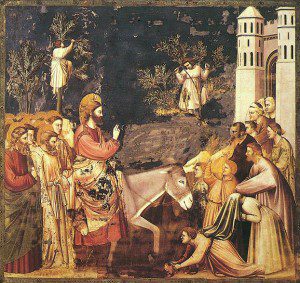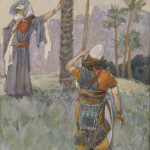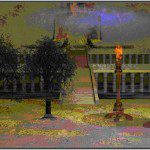 I delivered the Palm Sunday message yesterday at the Dawson Creek Church of the New Jerusalem; for the sermon, I focused on the Lord’s first act upon entering Jerusalem as recorded in the gospel of Matthew: to enter the temple and cast out all those who bought and sold there. Sermon audio is available at the New Church Audio site. Sermon text is below; reading the readings is highly encouraged! (For more passages and thoughts about “the wrath of God” and zeal vs. anger see this previous post, as well as this one.)
I delivered the Palm Sunday message yesterday at the Dawson Creek Church of the New Jerusalem; for the sermon, I focused on the Lord’s first act upon entering Jerusalem as recorded in the gospel of Matthew: to enter the temple and cast out all those who bought and sold there. Sermon audio is available at the New Church Audio site. Sermon text is below; reading the readings is highly encouraged! (For more passages and thoughts about “the wrath of God” and zeal vs. anger see this previous post, as well as this one.)
Readings: Matthew 21:1-17; Revelation 19:11-16; Arcana Coelestia 6997
“And Jesus said to them, ‘My house shall be called a house of prayer; but you have made it a cave of robbers.’ And there came to Him the blind and the lame in the temple; and He cured them.” (Matthew 21:13-14)
This morning we celebrate Palm Sunday, the day on which the Lord rode into Jerusalem on a donkey – the sign of the highest king and judge, and in fulfillment of the prophecy: that the Messiah, Israelite’s eternal king who would usher in an age of never-ending peace, would come riding on a donkey, and a colt, the foal of a donkey.
In the children’s talk, we focused on that triumphal entry itself. But for this sermon, we will focus on what is described next, what is recorded in the gospel of Matthew as the Lord’s very first act upon being heralded as the new king. Now if the Lord’s plan had been to institute a worldly kingdom, we might expect that His first act would be to go to the house of King Herod and demand that he relinquish his throne. But as the Lord told His disciples, “My kingdom is not of this world.” Now given this, that the Lord’s kingdom is spiritual and not natural, we might expect that the Lord’s first action upon entering Jerusalem might be simply to start teaching about heavenly things.
But that is not what happened either. The Lord did not come to establish a worldly kingdom, but His spiritual kingdom was never supposed to be merely an abstract, intellectual thing. His kingdom was coming to institute radical change, and in this case, even forceful change. His kingdom is not of this world, but it is very much in this world, and it is supposed to have a real effect on this world. And so the Lord’s first action in Jerusalem was to enter into the temple, the house of God, and to cast out all those who were buying and selling, to overturn the tables of the money-changers, and the seats of those who sold doves. These were people who made a profit by gouging those who were coming to worship, who had turned worship into a financial enterprise. In a deeper sense, they represent all those who use religious things for their own personal benefit; the book Apocalypse Explained says that they represent “those who make gain for themselves of holy things” (AE 840) The Lord came to the temple to cast out these merchants and restore it to its true purpose – a place for worship, and a place for healing.
Now we should pause here and acknowledge that to some people, these actions seem out of character for the Lord. The Lord is nothing but love and mercy and forgiveness – so how could He have acted with such seeming anger against the merchants in the temple? Now there is some truth to this: God is love, and in itself, love is gentle, kind, and soft. The book True Christian Religion says, “God cannot damn anyone, curse anyone, send anyone to hell, predestine any soul to eternal death, avenge wrongs, be angry, or punish. He cannot even turn Himself away from man, nor look upon him with a stern countenance. These and like things are contrary to His essence; and what is contrary to His essence is contrary to His very Self” (TCR 56). The Lord does not even punish – and yet, we know that those who do evil are punished. The reason is that evil, in the next life, carries with it its own punishment, so that the evil can be prevented from harming the good. But to those who have done the evil, it feels like it is God who is doing the punishing. To those who are in evil, the Lord’s love does not feel like love – it feels like anger, because that is what it inspires in them. Imagine, as a comparison, a father telling his son, as lovingly and calmly as possible, that he is not allowed to go to a party where there will be drugs and alcohol. The son comes up with one argument after another, raising his voice with every argument, and every time the father calmly answers, “No,” and gives his reasons. The son’s voice rises and eventually he is yelling at his father. And what is he likely to say to his father when his father firmly says no? “Stop yelling at me!” It is not the father who is angry or yelling, but to the person who is trying to fight it, that’s how it feels. It’s the same way with the Lord: His commandments are all for the sake of bringing about love, but they feel harsh and judgmental to those who want to argue against them.
So to return to our lesson – as the Lord went through the temple overturning tables and seats, we can picture Him as passionate and forceful – but “anger” is not the best word to describe where that was coming from. Anger implies some desire to harm or take revenge, and that motivation never existed in the Lord. What the Lord acted from was instead more properly referred to as “zeal.” In fact, the gospel of John says that these actions in the temple were in fulfillment of the prophecy, “Zeal for Your house has eaten me up” (John 2:17)
So, what is zeal, and what is the difference between zeal and anger? At its core, anger involves hatred and revenge, and a desire to hurt those it is directed against. But at the core of zeal is only love, and a desire to protect and defend something good. Although on the surface it appears like anger, on a deeper level zeal actually has more in common with grief. Listen to this passage from Arcana Coelestia:
Real spiritual indignation … derives nothing from the anger of the natural man, but from the interior essence of zeal. That zeal does indeed appear in the outward form like anger, but in internal form is not anger, nor even the indignation of anger; but is a certain sadness that is attended with a prayerful wish that it be not so. (AC 3909)
When the Word seems to describe the Lord acting from anger, in a deeper sense it is describing Him acting from that grief over the evil, His desire that it should not be so. A passage from the gospel of Mark describes the Lord looking around at crowd with “anger” – but is says immediately afterwards that He was grieved at the hardness of their hearts (Mark 3:5). The kind of anger there is not really anger as we experience it, but is in fact zeal.
Zeal acts from a desire to protect something good, and we can easily see that in the Lord’s actions in the temple. Note what happens immediately after those buyers and sellers had been cast out: “There came to Him the blind and the lame in the temple; and He cured them” (Matthew 21:14). The Lord’s passion was that the temple be a place for healing the blind and the lame – spiritually speaking, those who were suffering from a lack of truth or an inability to do good. But as long as the temple was about how much you could afford to give, how big and showy your sacrifices were, how deep your pockets were – there was no place for the humble, the outcasts, for those who acknowledged above all that the needed the Lord.
The Lord cast out those moneychangers and merchants because He had a deep love to defend the innocent people they had been stealing from, both naturally and spiritually. But here’s the amazing thing: the Lord also loved those very people He was casting out. The prophet Ezekiel records the word of Jehovah: “I have no delight in the death of the wicked; but that the wicked turn back from his way and live” (Ezekiel 33:11). The Lord cared as much about the salvation of those moneychangers as He did about the salvation of the blind and lame who came to Him afterward. But for those buyers and sellers, that love and desire to save was expressed in a radically different way than it was for those who knew they needed salvation. For them, it did not come gently, but with force and rebuke.
And sometimes, that’s the way it has to be for all of us. The Lord loves you, and He wants you to live in heaven with Him. But the only way for us to receive that love, to accept that gift of eternal life, is to shape ourselves into vessels for Him by living in accordance with His truth. And within each one of us are desires and habits that do not want to submit to the truth. To the extent that we cling to those and identify with those – that we say “this is who I am” – the Lord will not appear as meek and gentle, but as a mighty warrior, going forth to battle. Today we are talking about the Lord as king, and it is in regard to His Divine truth that the Lord is called king. We read earlier that description from the book of Revelation of the Rider on the white horse. As we read, His name was called “the Word of God” – a clear reference to the Lord as truth. And there is a name written on His garment and His side: “King of kings and Lord of lords.” A sharp sword was going forth from His mouth, and He rode out, conquering and to conquer.
To the evil within us, the part that does not want to change – what a terrifying image, an image almost of wrath and fury! But to the blind and the lame within us, to the innocence within us that cries out daily to be freed from our lusts, from our patterns of selfishness and self-destruction – what an image of hope! We need this image of the Lord, as much as we need the image of Him as a tender shepherd. In fact, the two are inseparable; we read of the Rider on the white horse, “And out of His mouth went forth a sharp sword, that with it He should smite the nations; and He shall shepherd them with an iron staff” (Revelation 19:15). For us to experience true innocence, we first have to cooperate with the Lord in going to war against our sins.
And that sometimes feels about as much like being loved as being punished by a parent feels like love to a child who has broken the rules. The Lord said in a letter to one of the churches in Asia, at the beginning of the book of Revelation, “As many as I love, I reprove [or rebuke] and chasten; be zealous therefore, and repent” (Rev. 3:19). The book Apocalypse Revealed compares the Lord to “a parent, who, if he loves his children, allows them to be chastised for the sake of removing their evils” (AR 216). But notice the second part of that quote from Revelation– the Lord is not only zealous Himself, He calls us to be zealous as well in our repentance. That means that rather than identifying with those parts of ourselves that are to be cast out, we can identify with Him, work with Him, to cast those things away.
So what does this look like, in more practical terms? What are those “buyers and sellers in the temple” that we need to get rid of? Are there parts of us that use the holy things of faith for gain? Now, in the strictest sense, this is something ministers in particular have to watch out for – to make sure that I am not using my position simply for the sake of gaining friends or a reputation or even money. But in a broader sense, this is something we are all tempted to. We are all tempted to use religion simply as a security blanket, to make us feel good about ourselves, without listening to the constant call within it to move beyond what is comfortable, to sacrifice our own wants for the sake of our neighbours, to put to death selfishness and envy and greed. We need to be willing to listen even to the words of the Lord that seem harsh. It is not enough to simply say, “The Lord is merciful, so it’s OK if I’m breaking a few of the commandments.” Yes, the Lord is merciful, yes He forgives us if we slip up while trying to follow Him – but for us to receive His mercy, for it to actually have any effect, we must be acting with energy and zeal to fight against the evil in ourselves that bars the way from Him flowing in. The simple, painful truth is this: if we continue to willfully live in sin, we will go to hell. And although the Lord in His mercy does everything He can to temper the torment of hell, make no mistake: hell really is hell. The spirits in hell are always angry, always frustrated, and never satisfied in their constant quest for dominion over one another.
That is one of those harsh truths, the biting edge of the sword of the Lord. We need to start from a belief – and a fear – that evil will take us to hell. But we don’t end there. When the Lord cast the buyers and sellers out of the temple, the temple did not stand empty – it was immediately filled with the blind and the lame, and with children crying out, “Hosanna to the Son of David!” We read in our passage from Arcana Coelestia earlier that as we cast out evil from our lives, our fear of hell transforms into a holy fear. We stop fearing so much the punishments of hell, and instead we learn to fear what being in hell would actually mean – that when we are in hell, when we do evil, we are harming the Lord, and harming the people whom He loves.
The Lord cast out those merchants to make room for the blind and the lame. The Lord works with us to cast out our selfishness, our evils, so that we can come to Him and be healed. And through that process of repentance, we recognize just how much we need that healing. We come to the Lord and say, “Lord, I’m blind – help me to understand Your Word, what it is You are asking of me.” We say, “Lord, I am lame – give me the strength to truly do good, because I’ve tried on my own and I know I can’t do it.” And the Lord does bring that healing that we so desperately need. We can understand His Word. We can learn to obey Him.
And on the other side of all that – we begin to experience something amazing. When we stop fighting Him, when we’ve stopped pushing back against His commandments, when have learned to simply and humbly say, “Yes, Lord” – then we begin to experience an incredible new innocence, a willingness to follow Him without question. We realize – I don’t need to come up with all the answers myself. I don’t have to push and push to make sure everything goes my way. I don’t have to worry and agonize over the future – it is in His hands. All I have do is say, “Yes, my King,” and to walk in His Word, to obey Him and to love Him, to love His people. What freedom there is in that! What peace! When we experience that kind of peace, there is something deep within our hearts that wants to shout out with joy. Think of those children in the temple, of whom the Lord said, “Out of the mouth of infants and sucklings, Thou hast perfected praise” – a picture of that innocent joy that comes when the Lord is truly the king. With those children, we shout out today, “Hosanna! Blessed is the King who comes in the name of the Lord!” Amen.










